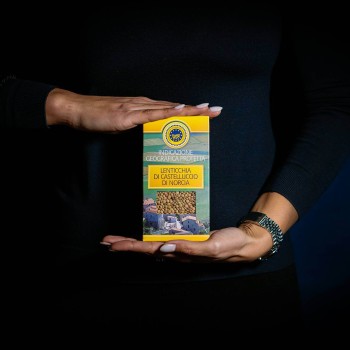Cooperativa Lenticchia IGP di Castelluccio di Norcia
The authentic lentils from Castelluccio di Norcia
Castelluccio di Norciais in the heart ofThe Monti Sibillini National Park, more than 1400 meters above sea level. The PGI Lentil Co-op was founded here in 1960 to promote and make known this legume’s ancient history and unique taste. A small, fine-skinned legumebut with incredible resistance. Thanks to the rather harsh climatic conditions in which it is born, in fact, the lentil of Castelluccio is the only legume that does not need to be treated because it is not attacked by the bean weevil.
The Co-op also cultivates and sells other legumes and cereals typical of the territory, such as spelt, grass pea and roveja, a wild pea native to the Monti Sibillini. It keeps an indissoluble link with the territory, which goes hand in hand with the utmost environmental attention. The method of sowing, in fact, is organic by tradition and is based on organic fertilization only.
If you go to Castelluccio in early summer you’ll be able to watch one of the most extraordinary shows of nature, Piangrande’s blossoming. The plain becomes a color palette, from the white lentils florets to the colorful tones of wild flowers, from the red of poppies to the intense blue of cyclamen and cornflowers. A true explosion of colors and scents, only possible because PGI lentil growers do not use any type of pesticide.
At the end of July, however, it is time to carp –cutting with the scythe – which traditionally belonged to the “carpirine”, the women of the village. Once cut, the lentils pass through the reeling (the harvest of the cut) and the crushing, the almost scenic moment where the farmer beats the lentils to get the seeds out of the pods with “lu mazzafrustu” (the flail). It is time for the chamfering: the wind blows away the chaff and leaves the seed. With the coating all the impurities are removed and the lentils are finally ready to be packed.
Castelluccio di Norcia’s lentil represents Co-op’s heart, which is directly responsible for sowing, growing, harvesting, packaging and placing it on the market. We are light years away from industrial production: what we have here is a niche product, with a very limited yield, a rare pearl indeed.
There is 1 product.






















